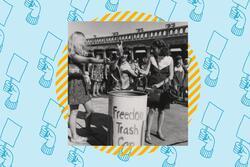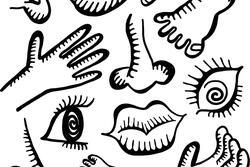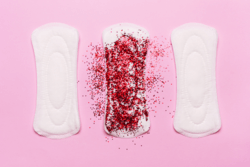"Our Bodies, Ourselves" in 2022
It’s the spring of 2019. I’m fourteen years old and in the eighth grade. I’ve just spent the last three months writing a bill about menstrual justice for my school's mock congress. Standing on a brown makeshift podium in front of a room of mostly thirteen-year-old boys and a male teacher, I tell them all about periods. Sounds mortifying, right?
Due to my “eat the patriarchy for breakfast” approach to life, however, I feel power in seeing the squeamish looks on their faces while discussing tampons, toxic shock syndrome, and how vaginas can absorb harmful chemicals from unregulated period products. This experience was the starting point of my journey with self-acceptance.
Now, flash forward to high school as I talk about estrogen, FSH (Follicle Stimulating Hormone), LH (Luteinizing Hormone) and progesterone levels with my Health 2 teacher, as we share resources on cycle syncing food and exercise, and as I buy tampons and pads in bulk at Costco while my Mexican father (raised in a culture that didn’t openly discuss anatomical topics) sheepishly tries to cover them with grocery bags. I haven’t always been so unashamed about my own anatomy—and I often still feel pressure to adhere to the taboos surrounding my body's health. During my stay at the autumn Rising Voices Fellowship August retreat, though, I encountered a book that empowered me to continue to educate myself about my body: Our Bodies, Ourselves.
I’d never read a book before Our Bodies, Ourselves that explicitly discussed and broke down myths about AFAB (assigned female at birth) bodies. Even with all of the feminist work I’ve tried to do, the book’s material felt foreign and a little uncomfortable. On the other hand, I craved this knowledge about my body that had been hidden in plain sight. I wanted to know more and to understand how this book came to be.
The idea for Our Bodies, Ourselves took root in 1969, when a group of twelve women (eight of whom were Jewish) sat down at Emmanuel College in Boston for a workshop called “Women and Their Bodies.” While discussing their experiences and frustrations, they realized how little they knew about their anatomy. Society had encouraged them to suppress their questions and emotions regarding health care. Their discussions about their personal relationships and their experiences with treatment by doctors revealed that they were not alone in their concerns. The twelve women decided to research and collect their findings to help both themselves and others. This project turned into a booklet called Women and their Bodies, later renamed Our Bodies, Ourselves to embrace the idea of people reclaiming the narrative around our own health care and bodies. This revolutionary book addressed taboo topics like abortion, pregnancy, postpartum depression, the power and role of male doctors, and the profit motive in the health care industry. Our Bodies, Ourselves came out during a time when abortion was illegal, birth control wasn’t readily available, and men had authored the small amount of accessible information about bodies assigned female at birth—it was a new, radical educational resource for people.
The initial marketing of the book happened mainly through word of mouth, and 250,000 copies were sold in New England. In 1973, the writers published an extended version of Our Bodies, Ourselves through a mainstream publisher to reach a larger audience. The women allowed this company to publish their book under the condition that they would remain in control of editorial decisions, as well as ensure a discount for non-profit health centers who purchased the book. Although the book received a lot of attention, the authors still pressed for its continued accessibility by demanding reduced costs for people with lower incomes, when they could have easily commercialized its success instead. Every few years, the writers reconstructed and republished the book to include issues relevant at the time. For example, the ninth edition, written in 2011, featured a new section on lesbian, bisexual, and asexual health.
I bet it took a lot of chutzpah to publish a book like Our Bodies, Ourselves back in the 1970s. The founding writers of Our Bodies, Ourselves understood that education (both formal and informal) can provide people with power, liberation, and autonomy. The twelve authors’ groundbreaking work allowed “ordinary” women to start the process of peacefully freeing themselves from the patriarchal culture surrounding health. As a society, we’ve come a long way since the 1970s and the origins of the women's liberation movement, but we still have a long way to go. The new generation of advocates for women’s rights and reproductive justice have a lot to learn from our foremothers—and one of these lessons is the power of education in our everyday lives.
Before I learned about my body and developed my feminist identity, I felt embarrassment surrounding my anatomy and my period. Everyone who gets a period knows the drill: there’s the expectation to hide a tampon or pad in your sleeve or pocket, to quietly ask a close friend to make sure you’re not bleeding or showing any signs of wearing a pad, and to be discreet about any symptoms of PMS. Honestly, this hide-and-seek around our bodies is exhausting. As soon as I started to inform myself about my anatomy, I felt freer and stronger, and became eager to educate others, too. (My friends sometimes get annoyed at me for how often I talk about human anatomy.)
I sometimes feel very powerless in my own life, especially during the era of COVID-19. It’s easy to feel as though I have no ability to make real change, but it’s times like these that the lessons of Our Bodies, Ourselves are most important. The everyday task of educating ourselves can lead to major societal change—the personal is indeed political, and activism on an individual scale is just as important as it is on a larger community scale. As a Jewish feminist, I have a responsibility to further the movement started by the writers of Our Bodies, Ourselves, and I hope to continue to enact change through honest, unapologetic discussions and education about our bodies.
This piece was written as part of JWA’s Rising Voices Fellowship.








I was at that conference in 1969 and I remember that the group divided into those who wanted to create the book and those who wanted to create a clinic. I was in the latter group and helped co-found the Cambridgeport Women's Clinic which ran (at least) from July 1972 to September 1973), serving hundreds of women with free health care and education. The late great women's historian and pioneering Women's Studies professor Laurie Crumpacker (1941-2024) and her husband Dr. Clyde Crumpacker were co-founders along with a collective of more than a dozen paramedics, several of whom went on to become doctors, medical educators and nurse practitioners.
Thanks for sharing your story. I bought a copy of Our Bodies, Our Selves when I was in college- and yes, it changed my life. ❤️
Hi Sofia! Thank you for this personal and honest piece. My aunt, Trude Bennett, is one of the women behind "Our Bodies, Ourselves," and we always had a copy in prominent view in our home. Thank you for reclaiming this groundbreaking book!